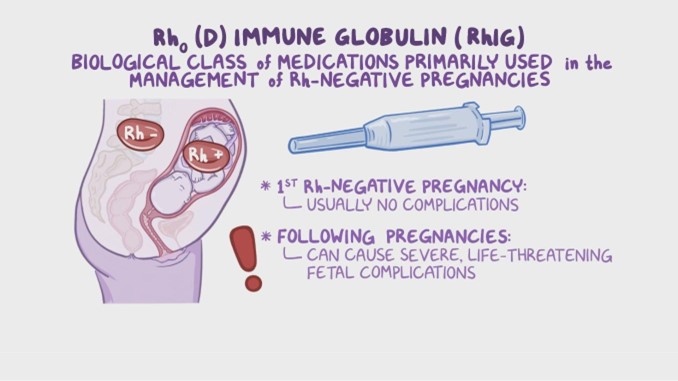A nurse is teaching a pregnant client who is Rh-negative about Rh(D) immune globulin. Which of the following statements by the client indicates an understanding of the teaching?
"If my partner is Rh-negative, I will not receive the shot.”
"I will receive the shot after delivery if my baby is Rh-negative.”
"I should not receive any immunizations for 3 months after the shot.”
"This shot may be given after birth to protect future pregnancies.”
The Correct Answer is D
Choice A rationale:
This statement is incorrect. The client should receive Rh(D) immune globulin (RhoGAM) if they are Rh-negative and their partner's Rh status is unknown or Rh-positive. This prevents the development of Rh antibodies in the mother's blood, which could be harmful in future pregnancies if the baby is Rh-positive.
Choice B rationale:
This statement is incorrect. Rh(D) immune globulin is administered to an Rh-negative mother within 72 hours after delivery if the baby is Rh-positive. This is done to prevent the mother from developing Rh antibodies that could affect subsequent pregnancies.
Choice C rationale:
This statement is incorrect. There is no restriction on receiving other immunizations after receiving Rh(D) immune globulin. The shot only protects against Rh incompatibility and does not interfere with other immunizations.
Choice D rationale:

This statement is correct. Rh(D) immune globulin can be given after birth to an Rh-negative mother with an Rh-positive baby. This helps protect the mother's future pregnancies from the potential harmful effects of Rh incompatibility.
Nursing Test Bank
Naxlex Comprehensive Predictor Exams
Related Questions
Correct Answer is B
Explanation
Choice A rationale:
Restricting protein intake to less than 40 g/day is not appropriate for a client with preeclampsia with severe features. While protein restriction might be advised in some cases of preeclampsia, it is not a priority in severe cases where the focus is on managing potential complications.
Choice B rationale:
Initiating seizure precautions is essential in managing a client with preeclampsia with severe features. Preeclampsia can lead to eclampsia, a condition characterized by seizures. Seizure precautions involve implementing measures to prevent injury during a seizure, such as padding the side rails of the bed, ensuring a clear environment, and having emergency equipment readily available.
Choice C rationale:
Initiating an infusion of 0.9% sodium chloride at 150 ml/hr is not directly related to managing preeclampsia with severe features. Although intravenous fluids may be necessary in some cases, the priority in this situation is to prevent and manage potential seizures.
Choice D rationale:
Encouraging the client to ambulate twice per day is not appropriate for a client with preeclampsia with severe features. Bed rest is often recommended in severe cases to reduce stress on the cardiovascular system and decrease the risk of complications.
Correct Answer is D
Explanation
Choice A rationale:
This statement is incorrect. The client should receive Rh(D) immune globulin (RhoGAM) if they are Rh-negative and their partner's Rh status is unknown or Rh-positive. This prevents the development of Rh antibodies in the mother's blood, which could be harmful in future pregnancies if the baby is Rh-positive.
Choice B rationale:
This statement is incorrect. Rh(D) immune globulin is administered to an Rh-negative mother within 72 hours after delivery if the baby is Rh-positive. This is done to prevent the mother from developing Rh antibodies that could affect subsequent pregnancies.
Choice C rationale:
This statement is incorrect. There is no restriction on receiving other immunizations after receiving Rh(D) immune globulin. The shot only protects against Rh incompatibility and does not interfere with other immunizations.
Choice D rationale:

This statement is correct. Rh(D) immune globulin can be given after birth to an Rh-negative mother with an Rh-positive baby. This helps protect the mother's future pregnancies from the potential harmful effects of Rh incompatibility.
Whether you are a student looking to ace your exams or a practicing nurse seeking to enhance your expertise , our nursing education contents will empower you with the confidence and competence to make a difference in the lives of patients and become a respected leader in the healthcare field.
Visit Naxlex, invest in your future and unlock endless possibilities with our unparalleled nursing education contents today
Report Wrong Answer on the Current Question
Do you disagree with the answer? If yes, what is your expected answer? Explain.
Kindly be descriptive with the issue you are facing.
